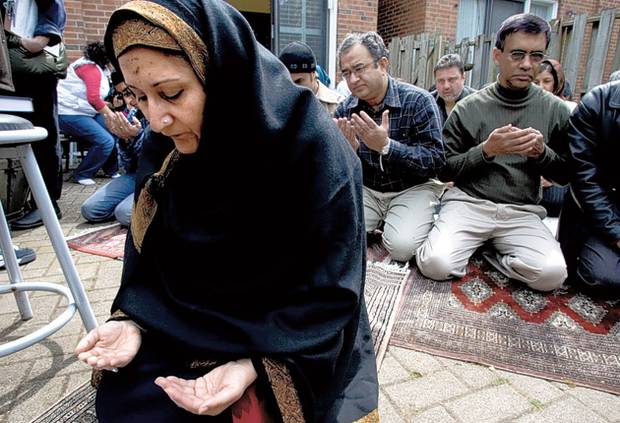pic courtesy of (www.muslimsforallah.com)
Almost a week ago, I joined www.meetup.com and started my own group – the Saturday Reform Jumuah. As its name suggests, it plans to have the Traditional congregational prayer on a Saturday. It is almost universally held on a Friday and so I have been mocked and verbally abused for my proposal.
My reasons for this proposal though should be obvious for anyone who has attends the prayers on a working day – there simply is not enough time to have a truly meaningful spiritual experience. I will explain further below.
I grew in a Traditional Muslim (Sunni) family. My late grandfather raised me and he was already a pensioner when I started going to Friday prayers with him. We used to go an hour and half earlier than the adhaan (call to prayer) so as to get to the first row. It was a very boring time for me as a child but as a young adult who had a keen interest in religion, it was wonderful. The mosque had an extensive library and I used to pore over books by Al-Ghazali and An-Nawawi before the prayer started.
When I was in secondary school too, ‘Friday’ prayers was not a rush job. Malaysian schooling times worked around it so even for the school’s afternoon session, we could walk to school at a leisurely pace after the prayer.
Some states in Malaysia, the northern more religious ones in particular, actually made Fridays their Sunday and so both students and working folks can have an unhurried Friday experience. This was not true for working folks in the other states. They would have to rush to have a quick lunch before the ‘Friday’ prayers and maybe a nap (or possibly nap during the sermon itself!) and perform the prayer. It was a most unsatisfactory experience.
And then there is an issue of mosque proximity. In Malaysia there are plenty of mosques, all run by the government who give a standardized sermon to be read state-wide. There is little room for variation and it becomes a robotic experience. However, I have lived twenty years in the UK, most of them in London and the problem here is the opposite: mosques are not so easy to find like in Malaysia. When you do find them, they may not be conducting the service in English or may not be of the flavour of Islam you seek.
These are my reasons. This is why we need a Saturday Jummah.
Think about it: Saturday are part of the weekend here in the West. People are off work and are looking to recharge their spiritual batteries. After a lie in on Saturday morning, they can have a leisurely breakfast then travel to central London or wherever our Jummas are held. They can read the Quran or have a chat amongst friends (socializing is part of Deen too!). We can then conduct the prayer and then proceed to do some social work. By evening, we can have a meal together and adjourn for the day. They can then have a complete rest on Sunday.
All in all, it would be a beautiful spiritual experience.
Detractors to the Saturday Reform Jumma idea have provided counter arguments which I hope to answer here. Here is the most obvious – they say the word ‘jumu’ah’ as per the Quran (Chapter 62 Verse 9) means Friday and hence it should be ‘Friday prayers’. This conclusion is all too superficial and does not take into account 2 facts:
- The root of the word ‘jumu’ah’ as it appears in the Quran (62/9) is jim meem ayn. If one looks at the concordance of the Quran, (here’s the best online resource: http://corpus.quran.com/qurandictionary.jsp?q=jmE) one would find that every occurrence of the root refers to assembly or bringing together. Why is it that ‘jumu’ah’ must specifically mean Friday then? Obviously because of convention rather than the original meaning.
- In Arabic, every other day is named after numbers. Sunday is ‘ahad’ (meaning ‘one’), Monday is ‘ithnayn’ (meaning ‘two’), Tuesday is ‘thalatha’ (meaning ‘three’), Wednesday is ‘arbi’aa’ (meaning ‘four’), Thursday is ‘khamiisa’ (meaning ‘five’) and Saturday is ‘sabt’ (meaning ‘seven’).
Why is Friday not named ‘sittah’ (meaning ‘six’)? The answer is quite simple. The day was appropriated by the early Muslims for their day of congregation. They did not want to be like Christians and Jews (who had their religious days on Sundays and Saturdays respectively) so they chose Fridays to carry out the Quranic command to congregate. Over time, the word ‘jumu’ah’ became known as Fridays. Language, after all, follows convention. In Arabic religious discourse, ‘hadith’ is known as the alleged ‘sayings, doings and abstentions of Prophet Muhammad’ yet the Quran’s use of the very same word contains no such implication at all. Conventional language is just that – language according to conventional usage.
While I understand the Muslim attachment to Fridays for their congregational prayer, the day is simply not workable for a deep, meaningful spiritual experience any more than fasting for a whole month (without iftar) in the North pole. Unless one is just after a ‘ticking the box’ type experience, it simply would not do. We need to place the function before the form. The idea is to congregate and recharge our spiritual batteries and even perform social service. This would truly be a meaningful experience, whatever day it happens!
To join the Saturday Reform Jummas, please click here: http://www.meetup.com/Saturday-Reform-Jumaah/













